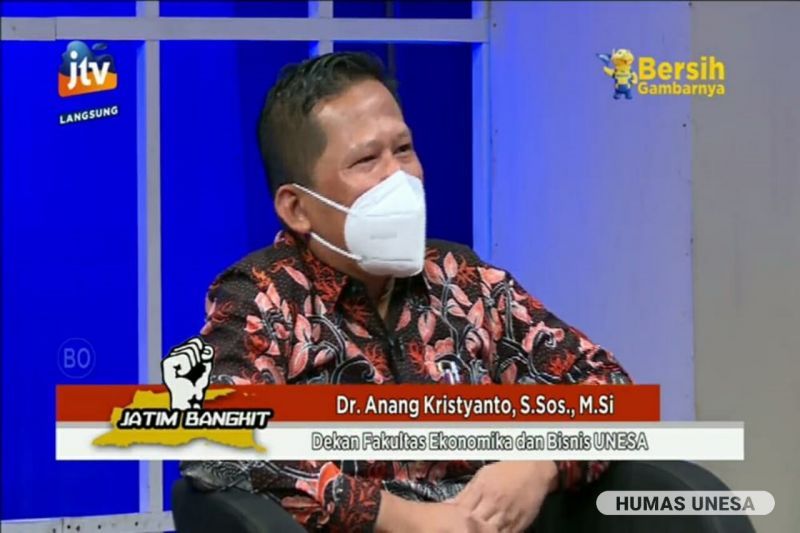
www.unesa.ac.id
unesa.ac.id-Surabaya, Dean of the Faculty of Economics and Business, Unesa Dr. Anang Kisyanto, S.Sos M.Si had the opportunity to be a resource person representing academics in a dialogue program on "Economic Rise Without Homecoming" on JTV on Monday (17/5/2021).
On that occasion, Anang side by side with other speakers, namely the head of the East Java BPS Dr. Dadang Hardiwan S.SI M.Si and the Chairman of the Association of Indonesian Food and Beverage Entrepreneurs in East Java, Yapto Willy Sinatra. With various scientific disciplines and their respective perspectives, the speakers discussed in detail the economic conditions of East Java during the pandemic.
Government policies related to tightening and encouraging homecoming have an impact on reducing household consumption, especially in the transportation sector, hotels, restaurants, food and beverages and the clothing sector. In some opinions, this government policy is not very significant. The Institute for Development of Economics and Finance (INDEF) noted that during the 2 weeks of Eid 2020, the money circulating in the community reached 114 trillion and the circulation of money increased in the momentum of Eid in 2021.
The government policy without going home, this year is not the same as last year, the homecoming policy can still be said to be rather loose, it can be proven by the fact that shopping centers are still busy.
According to Anang, the ban on going home has an impact on the economy in East Java. There was a decline in economic activity. However, it is not very significant. "Compared to the previous Eid, this year there is an increase in growth, although it is not too significant. In addition, there has been a shift in consumer behavior patterns, from ordering traditional food to an online ordering system from home, ”said Anang.
He continued, the circulation of money or the amount of money in circulation is an indicator of economic growth, especially before the Eid holiday allowance (THR) for ASN and employees to increase the amount of money in circulation which will certainly have an impact on increasing public consumption.
Even though the pandemic situation seems difficult, it can be a good momentum for the acceleration of the 4.0 industrial revolution in the midst of the people of East Java and Indonesia in general. As a result of the pandemic, producers and consumers are "forced" to adapt to the demands of the latest technological developments.
He emphasized that as long as the community is consistent and disciplined in implementing health protocols, the pandemic can quickly pass and economic conditions will quickly recover. According to him, business actors have resilience in surviving a pandemic. In addition, they also have high creativity in finding and designing new products.
At the end of his presentation, Anang also conveyed strategies for entrepreneurs to be able to survive and improve the economy of East Java. First, for the short term, business actors must be more creative in reading the opportunities for current consumer needs. Then it is also necessary to make efficiency while at the same time taking a minimalist profit margin as a form of community cooperation.
Second, in the medium term it is necessary to digitize business and the government must create a healthy digital business ecosystem. "I appreciate that currently Kemendikbud has obliged all study programs to take the digital business matkul and at FEB Unesa have implemented it. Next semester, we will open a digital business study program as a form of FEB Unesa's contribution in accelerating business digitization in the era of the 4.0 industrial revolution, "he said. (QQ / EHA / zam)
Share It On:






